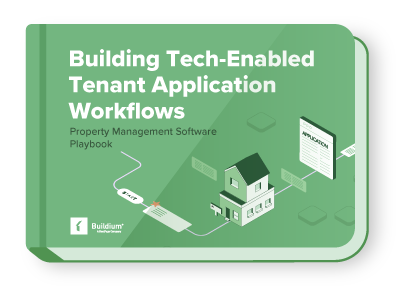Property owners expect property managers to do more than just collect rent and handle maintenance. They want to know how their rental properties are really performing—with data to back it up.
Start your free trial today!
Try Buildium for free for 14 days. No credit card needed.
Start Your TrialYou can meet their expectations by offering financial reporting and benchmarking as part of your property management services. It’s a smart way to stand out, keep your current clients happy, and win over new ones. If you’re not already offering it, there’s a good chance another property manager is.
In this post, we’ll explain what financial reporting and benchmarking look like for residential rental properties, the benefits of offering them, and how to implement them effectively.
What Are Financial Reporting Services?
Financial reporting services involve tracking, organizing, and presenting financial performance data to your clients. In residential property management, this includes income and expense tracking, balance sheets, cash flow statements, profit and loss statements, rent rolls, and more.
What Financial Reporting Services Look Like in Action
Property management software such as Buildium has data and analytics features to track metrics across revenue, expenses, and more. You can then share this data with owners via real-time dashboards and graphs that they can view from their owner portal. If you don’t have property management software in place, you’ll often have to prepare standard financial reports manually by property or portfolio and export them as PDF, XLS, XLSX, or CSV.
What Are Benchmarking Services?
Benchmarking services compare property performance against internal historical data or industry standards. It helps them see how their returns compare to past performance or similar properties. For example, you can track whether occupancy rates, maintenance costs per unit, rent collection speed, and other metrics are improving, stagnating, or worsening, and make adjustments accordingly.
What Benchmarking Services Look Like in Action
Buildium and a few other property management software lets you track leasing performance data, including vacancy rate, leasing activity, renewal/turnover rate, and more. You can then compare these metrics against past performance or similar “peer group” properties nearby. The same goes for rental income. You can use Buildium’s market rent analysis features to determine a property’s gross potential rent, potential rent, gain/loss to lease, and vacancy loss.
Benefits of Offering Financial Reporting and Benchmarking Services
Offering financial reporting and benchmarking services can boost your property management business in many ways. Here are just a few.
1. Setting Performance Standards
When you track rental performance data, you can begin to determine what “good performance” looks like and establish benchmarks accordingly. That way, you can improve your management strategy and hold your staff and vendors accountable.
Furthermore, setting performance standards lets you showcase how your services are adding value. Owners will see how their portfolio is performing compared to the past and competitors.
2. Establishing Yourself as a Long-Term Partner to Existing Clients
Regular financial reporting and benchmarking can help you build trust with existing clients. Plus, it’ll help spark conversations about business opportunities and risks. This shows that you’re not just a service provider, but a strategic advisor who can help boost their bottom line.
3. Positioning Services as a Competitive Advantage to Attract New Clients
Finding new owner clients takes work, especially in a competitive market. By offering data-backed financial reporting as part of your services, you can differentiate yourself from other property managers who only do the basics. You may also convince some landlords who are dissatisfied with their current property managers to switch to you.
Pro tip: To find qualified owner leads, sign up for All Property Management. It’s a free network of landlords and property managers that delivers leads directly to your email based on your location, ideal client, and other custom criteria.
4. Creating New Revenue Streams for Your Business
Offering financial reporting and benchmarking isn’t just helpful for your clients. It can give your bottom line a lift, too. How?
First, you can offer it as an add-on service for an additional charge. You could even follow a tiered pricing plan that includes zero, basic, and advanced reporting packages.
Second, regular financial reporting can motivate owners to make improvements and reinvest profits into growing their portfolio. This could open up new opportunities for you to manage additional units and further increase your revenue.
Best Practices for Implementing Financial and Benchmarking Reporting Services
Now that you know why you should offer financial reporting and benchmarking services, here are some tips for implementing them into your business.
Tip 1: Set Up Financial Reporting Systems
A solid reporting system lays the groundwork for everything that follows. This means establishing standard operating procedures (SOPs) for collecting, organizing, and reporting on rental performance data in a way that meets owners’ needs and regulatory requirements.
From there, automate as many intermediate tasks in your reporting system as possible, such as rent collection, data entry, and invoice tracking.
Tip 2: Choose the Right Software
The right software simplifies financial reporting. For example, Buildium not only includes the data and analytics tools we highlighted earlier, but also integrated accounting features. This lets you track every fee, deposit, and refund from a central hub, so you always have a financial picture of your portfolio.
You can also connect bank accounts to Buildium to streamline payments, reconcile bank statements, and ensure you’re following trust accounting rules.
Tip 3: Train Property Management Staff
Great tools get even better when your team knows how to use them. That’s where training your staff comes in. Demonstrate how to enter data, generate reports, and share them with owners. You may also want to cross-train to avoid skill gaps if key staff are unavailable.
Tip 4: Collect and Analyze Data
After setting up consistent processes for collecting rent and logging expenses, carefully validate and clean data to ensure it’s accurate and useful (something Buildium does automatically). From there, you can accumulate historical data to identify trends and anomalies.
Tip 5: Create Benchmarking Reports
Once you’ve nailed down how to track and share performance data, you can start creating benchmarking reports. These are custom reports that compare your client’s property performance against historical data and/or industry benchmarks.
To help clients understand their portfolio performance, benchmarking reports should include appropriate graphs and keep it simple, highlighting outlier properties and opportunities.
Tip 6: Integrate Benchmarking with Financial Reporting
Instead of creating separate reports for financial performance and benchmarking, integrate the two. For example, you could show a property’s vacancy rate over time on a line graph and include a second line with the market’s average vacancy rate. That way, an owner can quickly see how their property is performing over time and how it compares to nearby properties.
Common Reporting and Benchmarking Challenges and Solutions
Every new service has its hurdles. Here’s how to handle the ones you might face with reporting and benchmarking.
Overcome Data Accessibility Issues
Without reliable data, it’s hard to report on a property’s finances or set benchmarks. That’s why it’s important to standardize data entry and use software that stores and organizes it on a central platform and encourages digital transactions. For example, Buildium enables tenants to pay rent online and you to pay vendors online and integrates records of those transactions with its broader set of accounting and business performance tools.
Keep Data Accurate
Keeping data accurate is a constant battle. To minimize human errors, automate data collection wherever possible, conduct regular internal audits, and train your staff on proper entry and categorization protocols. The last thing you want is to report inaccurate metrics to your clients.
Maintain Client Confidentiality
When handling your client’s financial data, you must protect it from loss, theft, or damage. Start by limiting data access among team members based on their roles. Then train them on best data security practices, such as using strong passwords and multi-factor authentication (MFA).
If you choose to use other clients’ data for benchmarking, keep it anonymous and clearly communicate your privacy policies. You also have to regularly check that you’re complying with relevant data protection regulations such as the CCPA and GDPR.
Software to Help You Introduce Services to Your Clients
Reporting and benchmarking can bring real value to your business. They make it easier to share performance insights with clients, spot trends across your portfolio, and make informed decisions. Whether you’re offering these services already or just starting to explore them, the right tools can make all the difference.
Buildium includes built-in financial reporting and analytics features designed to support these efforts. You can generate professional owner reports, track key metrics over time, and start building a foundation for meaningful benchmarking—all from a single platform.
Want to see how it works in practice? Start with a 14-day free trial or schedule a guided demo.
Frequently Asked Questions
What types of financial reports can property managers provide to their clients?
Property managers can provide profit and loss statements, balance sheets, cash flow statements, rent rolls, and income and expense reports by property or portfolio.
How does financial benchmarking benefit property owners or investors?
Benchmarking helps owners understand how their properties are performing over time or against similar properties, revealing opportunities to reduce inefficiencies and boost profits.
What tools or software are recommended for property managers to streamline financial reporting?
Buildium is a leading property management platform that streamlines financial reporting and benchmarking with integrated accounting, analytics, and customizable dashboards.
How frequently should property managers deliver financial reports to clients?
Financial reports should be delivered at least monthly, with additional updates as needed to promote transparency and strategic decision-making.
What key financial metrics should be included in a property management benchmark report?
Key metrics should include occupancy rate, rent collection speed, maintenance cost per unit, gain/loss to lease, and gross potential rent.
Read more on Accounting & Reporting

